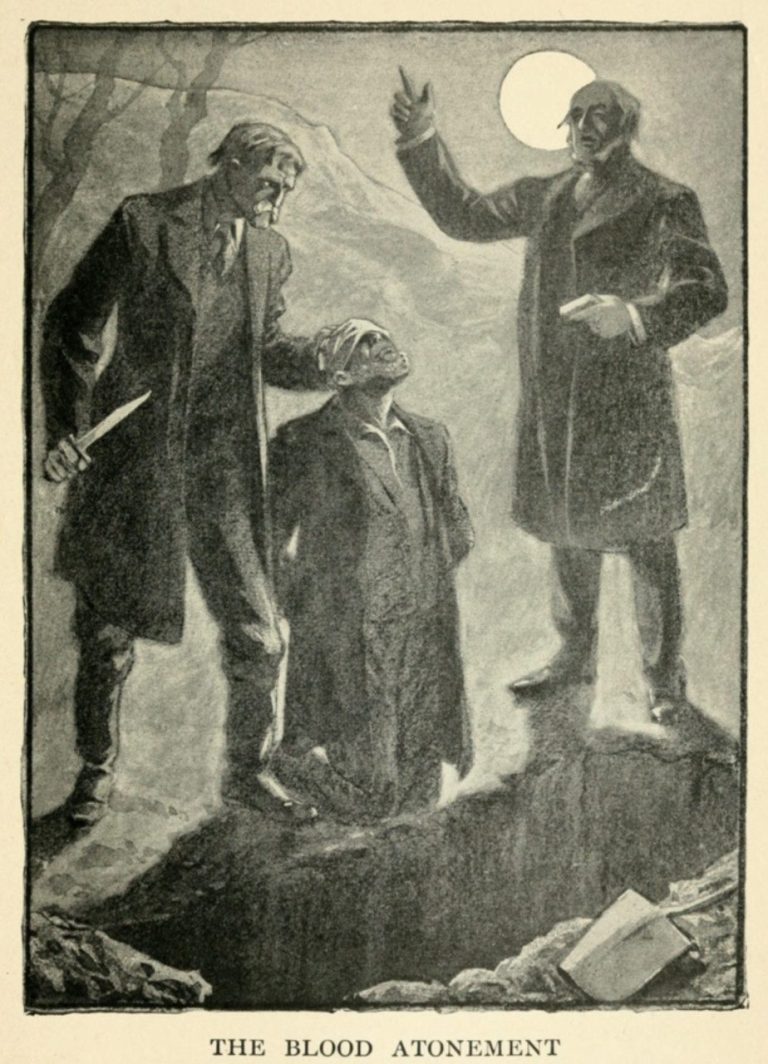
Blood Atonement
What is the blood atonement? Was it considered a doctrine necessary for salvation? When did that teaching end? Was anyone a victim of blood atonement?
Joseph Smith, Jr.
November 1838
In November of 1838, Joseph Smith “said that he did not wish to do any thing unlawful— he <then> spoke of the fate of Judas, and said that Peter had hung him Judas.”
This is very like the doctrine of blood atonement and might be exactly what Joseph Smith was referring to.
[Minutes and Testimonies, 12–29 November 1838 [State of Missouri v. Gates et al. for Treason]

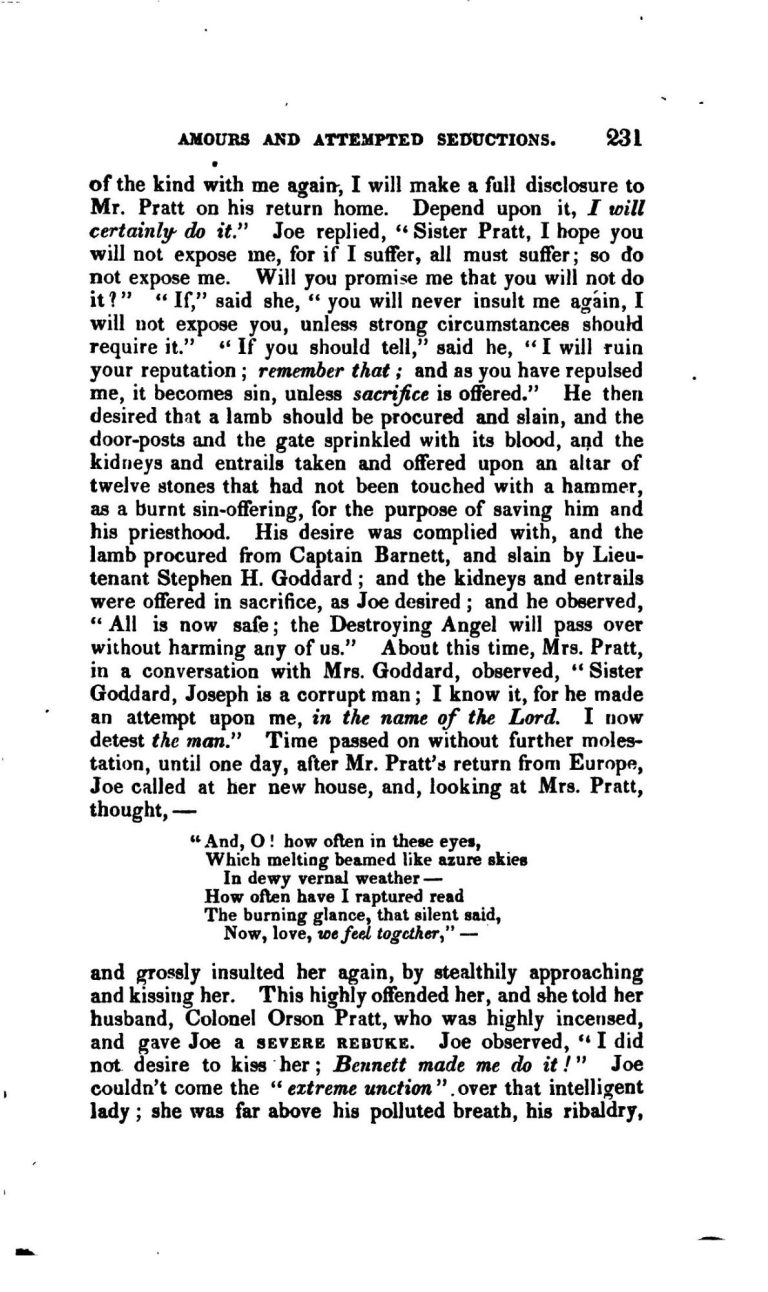
John C. Bennett
John C. Bennett, History of the Saints, pg. 231
While John C. Bennett's book should be taken with some amount of skepticism, there are examples of Joseph Smith teaching blood atonement, or perhaps an earlier, unpolished version of it.
"Joe afterwards tried to convince Mrs. Pratt of the propriety of his spiritual wife doctrine, and she at last told j him peremptorily, " Joseph, if you ever attempt any thing of the kind with me again, I will make a full disclosure to Mr. Pratt on his return home. Depend upon it, I will certainly do it." Joe replied, "Sister Pratt, I hope you will not expose me, for if I suffer, all must suffer; so do not expose me. Will you promise me that you will not do it?" "If," said she, " you will never insult me again, I will not expose you, unless strong circumstances should require it." "If you should tell," said he, "I will ruin your reputation; remember that; and as you have repulsed me, it becomes sin, unless sacrifice is offered." He then desired that a lamb should be procured and slain, and the door-posts and the gate sprinkled with its blood, and the kidneys and entrails taken and offered upon an altar of twelve stones that had not been touched with a hammer, as a burnt sin-offering, for the purpose of saving him and his priesthood. His desire was complied with, and the lamb procured from Captain Barnett, and slain by Lieutenant Stephen H. Goddard and the kidneys and entrails were offered in sacrifice, as Joe desired; and he observed, "All is now safe; the Destroying Angel will pass over without harming any of us." About this time, Mrs. Pratt, in a conversation with Mrs. Goddard, observed, "Sister Goddard, Joseph is a corrupt man; I know it, for he made an attempt upon me, in the name of the Lord, I now detest the man."
Joseph Smith, Jr.
1843
In 1843, Joseph Smith (or his scribe) commented that the common execution method in Christian nations was hanging, "instead of blood for blood according to the law of heaven."
"hanging is the popular method of execution, among the gentiles, in all countries professing christianity; instead of blood for blood, according to the law of heaven."
[History, 1838–1856, volume A-1 (23 December 1805–30 August 1834)]

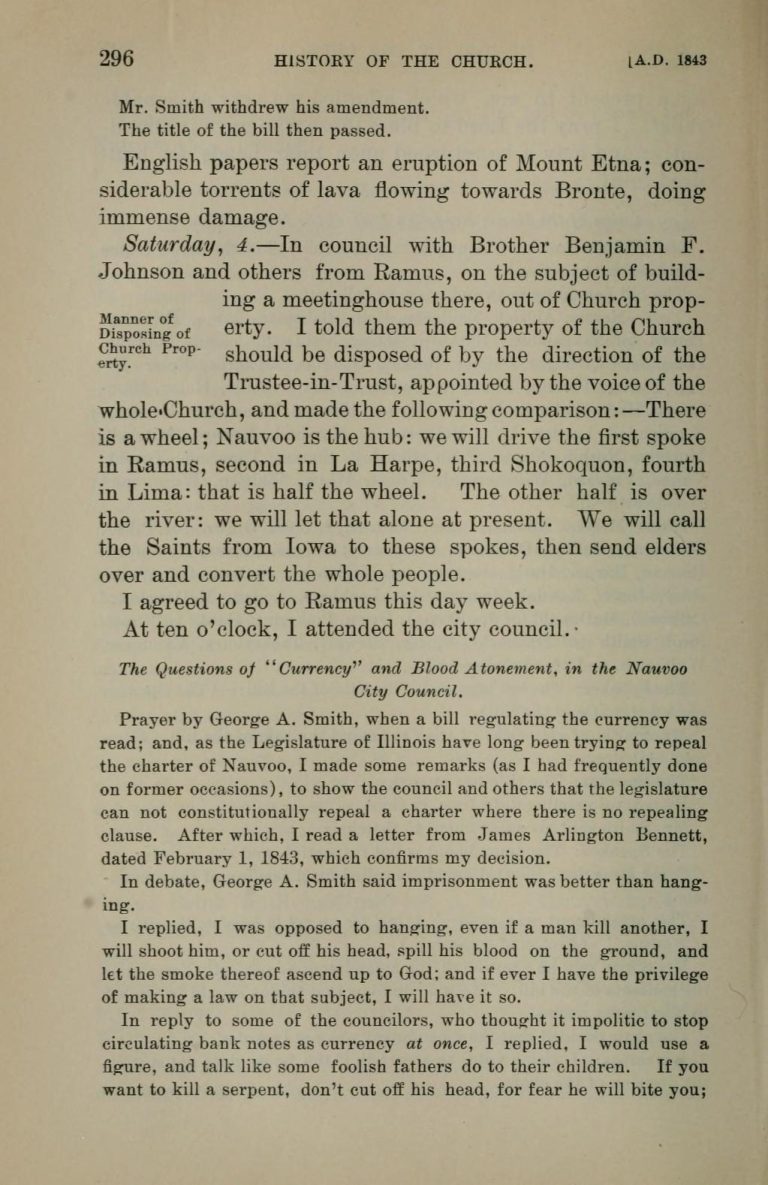
Joseph Smith
March 4, 1843
History of the Church, vol. 5, pg, 296
"In debate, George A. Smith said imprisonment was better than hanging.
"I replied, I was opposed to hanging, even if a man kill another, I will shoot him, or cut off his head, spill his blood on the ground, and let the smoke thereof ascend up to God; and if ever I have the privilege of making a law on that subject, I will have it so."
Joseph Smith
April 6, 1843
In the first manuscript version of the minutes of General Conference on April 6, 1843, Joseph Smith is recorded as saying:
“I’ll wring a thief’s neck off if I can find him. If I cannot bring him to justice any other way.”

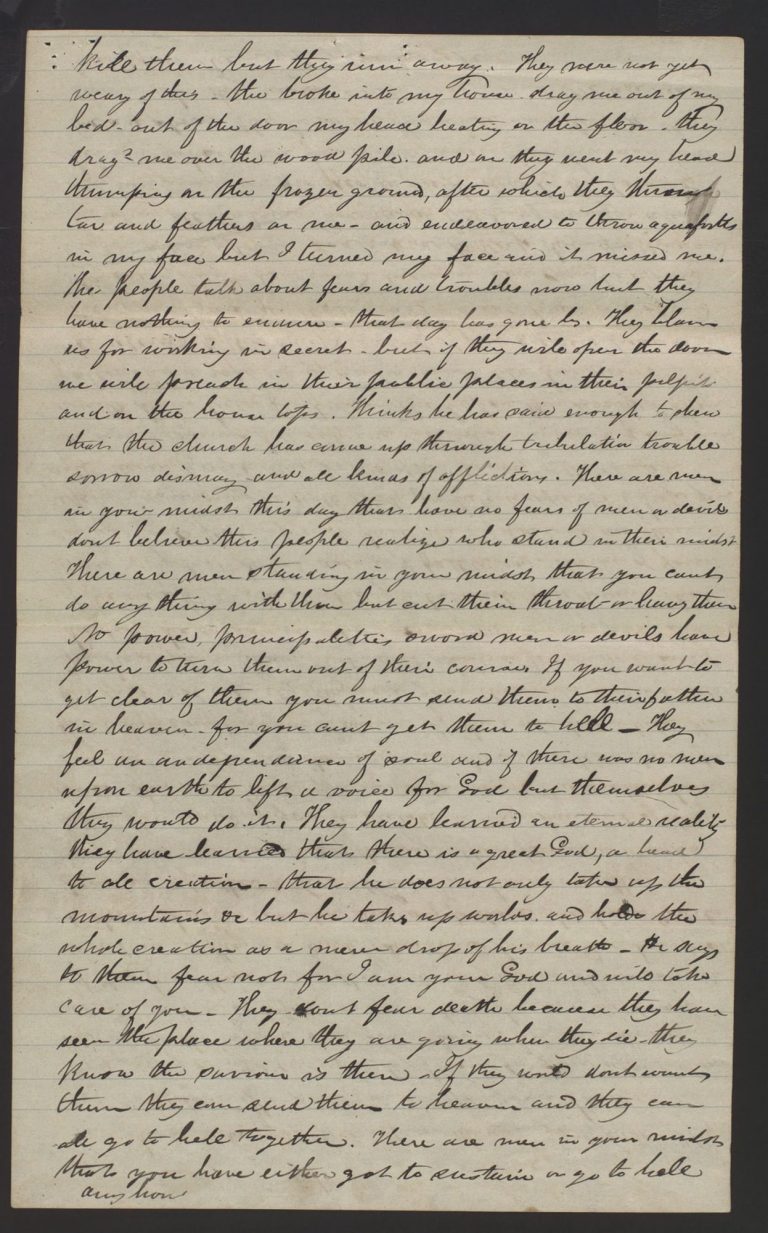
Sidney Rigdon
April 6, 1844
"There are men standing in your midst that you cant do any thing with than but cut their throat or hang them..."
[Minutes and Discourses, 6–8 April 1844, as Reported by William Clayton]
Brigham Young
27 March, 1853
“I say, rather than that apostates should flourish here, I will unsheath [sic] my bowie knife, and conquer or die [Great commotion in the congregation, and a simultaneous burst of feeling, assenting to the declaration.]. Now, you nasty apostates, clear out, or judgment will be put to the line, and righteousness to the plummet [Voices, generally, ‘go it, go it.']. If you say it is right, raise your hands [All hands up.]. Let us call upon the Lord to assist us in this, and every good work.”
[Prophet Brigham Young, Journal of Discourses, v. 1, p. 83]


Brigham Young
8 May 1853
“If you want to know what to do with a thief that you may find stealing, I say kill him on the spot, and never suffer him to commit another iniquity. I will prove by my works whether I can mete out justice to such persons, or not. I would consider it just as much my duty to do that, as to baptize a man for the remission of his sins.”
[Brigham Young, Journal of Discourses, v. 1, pp. 108-109]
Brigham Young
February 18, 1855
“I will tell you how much I love those characters. If they had any respect to their own welfare, they would come forth and say, whether Joseph Smith was a Prophet or not, ‘We shed his blood, and now let us atone for it;' and they would be willing to have their heads chopped off, that their blood might run upon the ground, and the smoke of it rise before the Lord as an incense for their sins.”
[Brigham Young, Journal of Discourses, v. 2, p. 186, February 18, 1855]


Brigham Young
16 March 1856
You say, 'That man ought to die for transgressing the law of God.' Let me suppose a case. Suppose you found your brother in bed with your wife, and put a javelin through both of them, you would be justified, and they would atone for their sins, and be received into the kingdom of God. I would at once do so in such a case; and under such circumstances, I have no wife whom I love so well that I could not put a javelin through her heart, and I would do it with clean hands. But you who trifle with your covenants, be careful lest in judging you will be judged.
Every man and women has got to have clean hands and a pure heart, to execute judgment, else they had better let the matter alone.
Again, suppose the parties are not caught in their iniquity, and it passes along unnoticed, shall I have compassion on them, for transgressions of the nature already named, or for those of any other description. If the Lord so order it that they are not caught in the act of their iniquity, it is pretty good proof that he is willing for them to live; and I say let them live and suffer in the flesh for their sins, for they will have it to do.
There is not a man or woman, who violates the covenants made with their God, that will not be required to pay the debt. The blood of Christ will never wipe that out, your own blood must atone for it; and the judgments of the Almighty will come, sooner or later, and every many and woman will have to atone for breaking their covenants. To what degree? Will they have to go to hell? They are in hell enough now. I do not wish them in a greater hell, when their consciences condemn them all the time. Let compassion reign in our bosoms. Try to comprehend how weak we are, how we are organized, how the spirit and the flesh are continually at war."
Brigham Young
21 September 1856
There are sins that men commit for which they cannot receive a forgiveness in this world, or in that which is to come, and if they had their eyes open to see their true condition, they would be perfectly willing to have their blood spilt upon the ground, that the smoke thereof might ascend to heaven as an offering for their sins; and the smoking incense would atone for their sins, whereas, if such is not the case, they will stick to them and remain upon them in the spirit world.
I know, when you hear my brethren telling about cutting people off from the earth, that you consider it is strong doctrine; but it is to save them, not destroy them...
"I know that there are transgressors, who, if they knew themselves and the only condition upon which they can obtain forgiveness, would beg of their brethren to shed their blood, that the smoke might ascend to God as an offering to appease the wrath that is kindled against them, and that the law might have its course.”
[Brigham Young, Journal of Discourses, v. 4, p. 53]


Brigham Young
21 September 1856
“It is true that the blood of the Son of God was shed for sins through the fall and those committed by men, yet men can commit sins which it [the blood of Christ] can never remit.”
[Brigham Young, Journal of Discourses, v. 4, p. 54]
Brigham Young
8 February 1857
“The time has been in Israel under the law of God, the celestial law, or that which pertains to the celestial law, for it is one of the laws of that kingdom where our Father dwells, that if a man was found guilty of adultery, he must have his blood shed, and that is near at hand...”
“Now take a person in this congregation who has knowledge with regard to being saved... and suppose that he has committed a sin that he knows will deprive him of that exaltation which he desires, and that he cannot attain to it without the shedding of blood, and also knows that by having his blood shed he will atone for that sin and may be saved and exalted with the God, is there a man or woman in this house but what would say, ‘shed my blood that I may be saved and exalted with the Gods?'”
[Brigham Young, Journal of Discourses, v. 4, p. 219]


Brigham Young
18 February 1857
“Will you love your brothers and sisters likewise, when they have committed a sin that cannot be atoned for without the shedding of their blood? Will you love that man or woman well enough to shed their blood? That is what Jesus Christ meant.”
“Any of you who understand the principles of eternity – if you have sinned a sin requiring the shedding of blood, except the sin unto death – would not be satisfied or rest until your blood should be spilled, that you might gain the salvation you desire. This is the way to love mankind.”
[Brigham Young, Deseret News, pg, 397, February 18, 1857]
1889 Manifesto
Perhaps due to the negative implications of the Blood Atonement doctrine becoming public, The Mormon First Presidency and the Quorum of the Twelve Apostles released a manifesto on December 4, 1889. It reads in part:
“We denounce as entirely untrue the allegation which has been made that our Church favors or believes in the killing of persons who leave the Church or apostatize from its doctrines. We would view a punishment of this character for such an act with the utmost horror, it is abhorrent to us and is in direct opposition to the fundamental principles of our creed.”

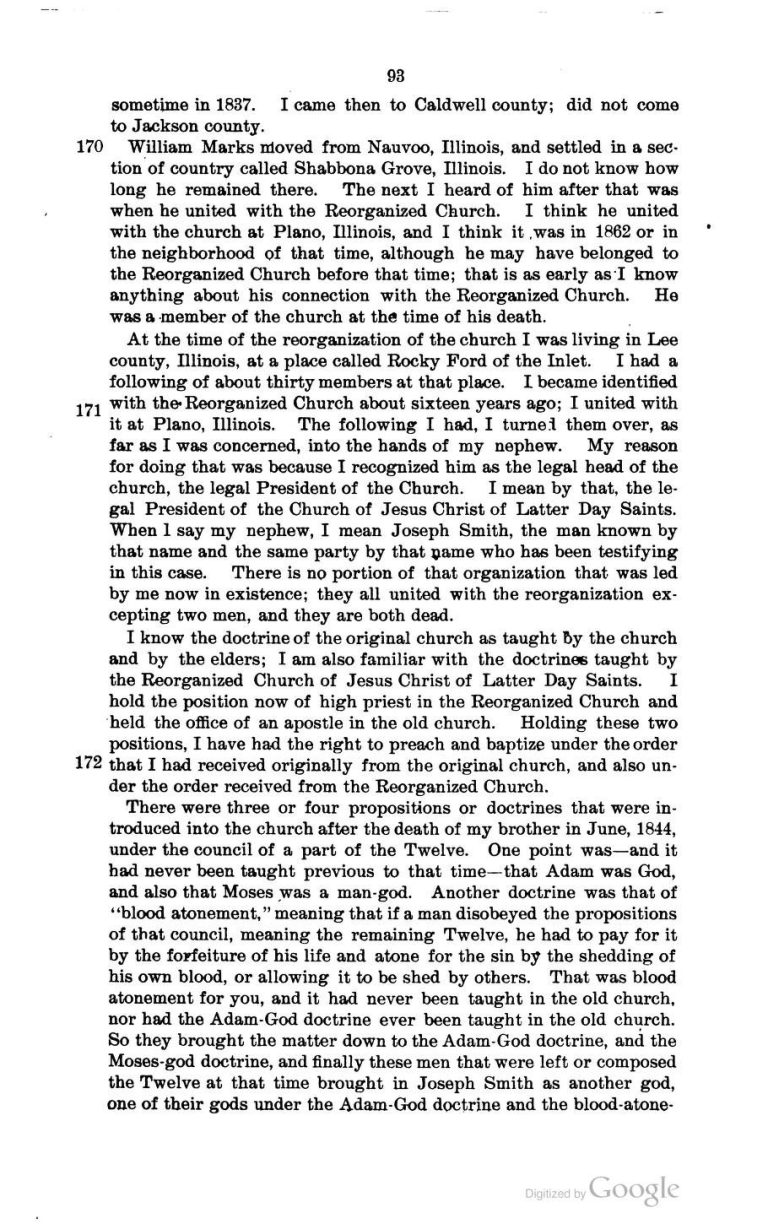
William Smith
Temple Lot Case, pg 93, 1891-1896
From William Smith, Joseph Smith's brother, we learned more about blood atonement:
"Another doctrine was that of 'blood atonement,' meaning that if a man disobeyed the propositions of that council, meaning the remaining Twelve, he had to pay for it by the forfeiture of his life and atone for the sin by the shedding of his own blood, or allowing it to be shed by others. That was blood atonement for you, and it had never been taught in the old church, nor had the Adam-God doctrine ever been taught in the old church. So they brought the matter down to the Adam-God doctrine, and the Moses-god doctrine, and finally these men that were left or composed the Twelve at that time brought in Joseph Smith as another god, one of their gods under the Adam-God doctrine and the blood-atonement doctrine. Another point was the marriage question in regard to the plurality of wives that was taught after the death of Joseph and Hyrum Smith, my brothers. These new doctrines that I spoke of were what caused the separation between me and that body of people, and neither of them were taught previous to 1844 nor for some time after 1844.
"The Reorganized Church of Jesus Christ of Latter Day Saints does not now and never did teach or hold to these doctrines. The branch of the Mormon Church that did teach these doctrines is what are called the Utah Mormons.
"I was well acquainted with the doctrines of the original church from 1830 to 1844; that is, the doctrine that was taught in the church. The doctrine of the Reorganized Church of Jesus Christ of Latter Day Saints is a perfect representation of the doctrine as taught by the original church founded in 1830. I have no knowledge whatever in relation to any difference in the doctrine taught by the Reorganized Church and that taught by the original church from 1830 down to 1844."
[William Smith's testimony, Temple Lot Case, pg 93]
NOTE: William Smith did not believe that Joseph Smith was a polygamist. Despite his assurance, it seems that William was not as familiar with church doctrine as he thought he was.
Lowell M. Snow
Encyclopedia of Mormonism, 1992
The doctrines of the Church affirm that the Atonement wrought by the shedding of the blood of Jesus Christ, the Son of God, is efficacious for the sins of all who believe, repent, are baptized by one having authority, and receive the Holy Ghost by the laying on of hands. However, if a person thereafter commits a grievous sin such as the shedding of innocent blood, the Savior's sacrifice alone will not absolve the person of the consequences of the sin. Only by voluntarily submitting to whatever penalty the Lord may require can that person benefit from the Atonement of Christ.
Several early Church leaders, most notably Brigham Young, taught that in a complete theocracy the Lord could require the voluntary shedding of a murderer's blood-presumably by capital punishment-as part of the process of Atonement for such grievous sin. This was referred to as "blood Atonement." Since such a theocracy has not been operative in modern times, the practical effect of the idea was its use as a rhetorical device to heighten the awareness of Latter-day Saints of the seriousness of murder and other major sins. This view is not a doctrine of the Church and has never been practiced by the Church at any time.
Early anti-Mormon writers charged that under Brigham Young the Church practiced "blood Atonement," by which they meant Church-instigated violence directed at dissenters, enemies, and strangers. This claim distorted the whole idea of blood atonement-which was based on voluntary submission by an offender-into a supposed justification of involuntary punishment. Occasional isolated acts of violence that occurred in areas where Latter-day Saints lived were typical of that period in the history of the American West, but they were not instances of Church-sanctioned blood Atonement.
[Lowell M. Snow, "Blood Atonement" Encyclopedia of Mormonism, pg 131]


Deseret News
18 June 2010
The Church of Jesus Christ of Latter-day Saints released this statement Wednesday:
In the mid-19th century, when rhetorical, emotional oratory was common, some church members and leaders used strong language that included notions of people making restitution for their sins by giving up their own lives.
However, so-called "blood atonement," by which individuals would be required to shed their own blood to pay for their sins, is not a doctrine of The Church of Jesus Christ of Latter-day Saints. We believe in and teach the infinite and all-encompassing atonement of Jesus Christ, which makes forgiveness of sin and salvation possible for all people.
["Mormon church statement on blood atonement," Deseret News, June 18, 2010]
Official Church Website
Gospel Topics Essay
Today, the church admits this teaching on their website.
“Drawing on Biblical passages, particularly from the Old Testament, leaders taught that some sins were so serious that the perpetrator’s blood would have to be shed in order to receive forgiveness.”
[Gospel Topics Essay, “Peace and Violence Among 19th Century Latter-day Saints”]

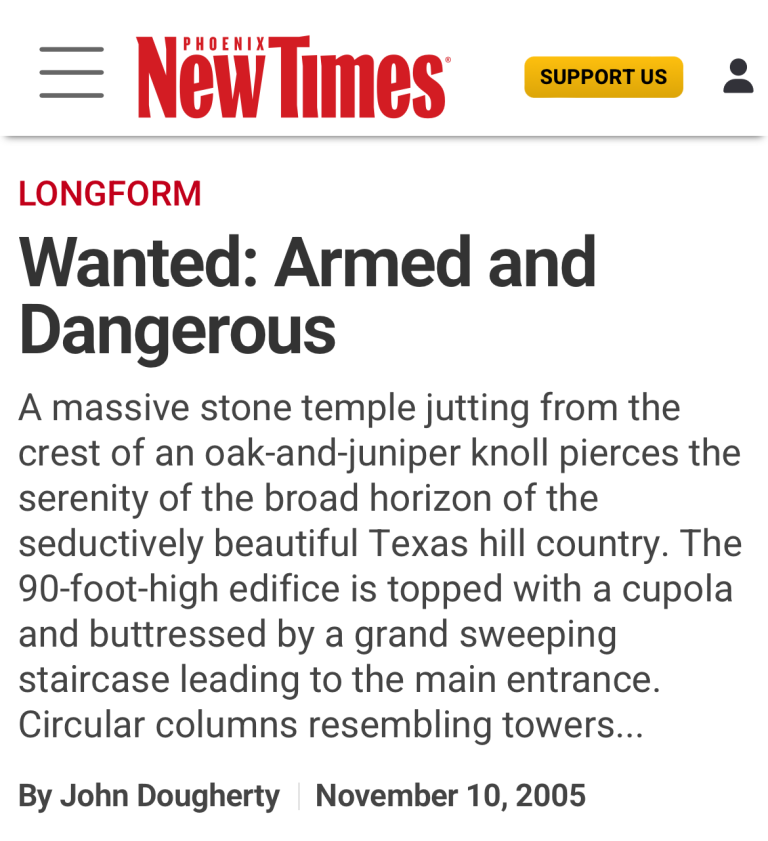
Fundamental
LDS Church
In a 2005 article from the Phoenix New Times, they interviewed a former member of the FLDS church named Robert Richter.
“A former FLDS member who left the church in April tells New Times he believes Jeffs is building a blood-atonement room in the Texas temple where sinners' throats would be slit and their bodies burned in a DNA-incinerating crematory. It is believed by strict constructionists of FLDS doctrine that this last-gasp ritual is sometimes necessary to ensure a sinner's eternal salvation.”
Robert Richter says he left the church in April while he was working on a "secret project" to build computer controls for an extremely high-temperature thermostat that he now fears could be used to operate such a crematory at the temple to dispose of the remains of blood-atonement victims.
The Church of the
Lamb of God
In addition to the FLDS church, Ervil LeBaron’s church “The Church of the Lamb of God” (a Mormon faction) also believes in the blood atonement. LeBaron initiated a series of killings that ultimately resulted in his being sentenced to life in prison. Before his death in prison, LeBaron wrote a document called “The Book of the New Covenants” that listed a number of people who had been disloyal and “deserved to die.” LeBaron’s followers made copies of the list and began to administer the blood atonement.
One of LeBaron’s daughters, Lillian Chynoweth, related the murders of her husband, her brother-in-law, and his eight year old daughter at the hands of her half-brothers on the 144th anniversary of Joseph Smith’s death. She said that their names were “on the list to be atoned for” because her father believed that they were “traitors to God’s cause” [The God Makers 2, 1993, timestamp 14:00]

Victims of Blood Atonement
In her book "Wife No. 19" Ann Eliza Webb Young made a very concerning statement. She said that
There exists an "already appallingly long list of men and women foully dealt with and sent into eternity without a moment's warning, for no crime at all except for daring to differ, if ever so slightly, from those in authority."
-Ann Eliza Webb-
Mr. Hatten, Ann Eliza's cousin-in-law, his crime? Being a Gentile and wanting to move to California. [pg. 205]
Jesse Earl, his crime? No idea. Somehow "his sins were past forgiveness" [pg. 206]
Almon Babbitt, his crime was that he wanted to return to the States [206-207]
John Evan had shot a man in Council Bluffs. He visited Brigham Young, "and begged to atone for his crime in the usual way" [207]
Duff Potter, murdered for apostasy [pg. 207]
William Parrish, murdered for apostasy [pg. 207]
Beatson Parrish [pg. 207]
Dr. J. King Robinson, his crime was being a popular Gentile [pg. 207]
Mrs Jones and her son
Mr. Jones from Payton, UT. who were suspected for falling away from the church [pg. 207-208]
Lobbs [pg. 295]
Mr. Bake [pg. 300-302]
John Aiken, part of the Aiken party, murdered for being Gentiles and having with them $25,000.
Thomas Aiken, part of the Aiken party, murdered for being Gentiles and having with them $25,000.
John Achard, part of the Aiken party, murdered for being Gentiles and having with them $25,000.
Andrew J. Jones, part of the Aiken party, murdered for being Gentiles and having with them $25,000.
Horace Bucklin, part of the Aiken party, murdered for being Gentiles and having with them $25,000.
Story of L. P. Langford is noteworthy, though he was was not killed [pg. 289-290]
In the book by M. W. Montgomery titled The Mormon Delusion: Its History, Doctrines, and the Outlook in Utah, gives additional names of persons who were "blood atoned." In addition to give the names of the Aiken party, Almon Babbit, Dr. Robinson, the Potter and Parrish's,
Mr. Yates, "killed under atrocious circumstances" [pg. 165]
Franklin McNeil, he had "sued Brigham for false imprisonment and was killed at his hotel door" [pg. 165]
Sergeant Pike [pg. 165]
Mr. Arnold [pg. 165]
Mr. Drown [pg. 165]
Price Bryan [pg. 165]
William Bryan [pg. 165]
Mr. Brassfield [pg. 165]
James Cowdy [pg. 165]
Mrs. Cowdy, Jame's wife [pg. 165]
Child Cowdy, child of James and his wife [pg. 165]
Mr. Margetts and [pg. 165]
Mrs. Margetts, his wife [pg. 165]
Leutenant Gunnison and his party [pg. 165]
Mr. Forbes [pg. 165]
Andrew Bernard [pg. 165]
A woman killed by her own husband, not named [pg. 165]
Morris, a "rival prophet" [pg. 165]
Mr. Banks [pg. 165]
Four women who belonged with the part of Morris and Banks [pg. 165]
Isaac Potter [pg. 165]
Charles Wilson [pg. 165]
John Walker [pg. 165]
"The death list is too long for me to venture to give it."
-M. W. Montgomery-